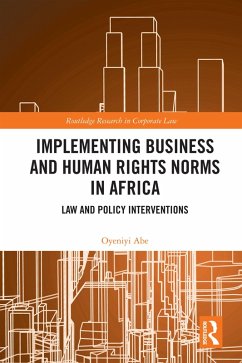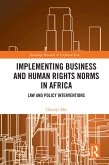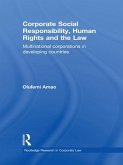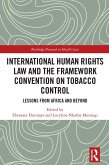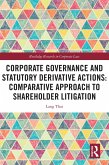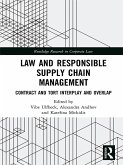Oyeniyi Abe
Implementing Business and Human Rights Norms in Africa: Law and Policy Interventions (eBook, ePUB)
43,95 €
43,95 €
inkl. MwSt.
Sofort per Download lieferbar

22 °P sammeln
43,95 €
Als Download kaufen

43,95 €
inkl. MwSt.
Sofort per Download lieferbar

22 °P sammeln
Jetzt verschenken
Alle Infos zum eBook verschenken
43,95 €
inkl. MwSt.
Sofort per Download lieferbar
Alle Infos zum eBook verschenken

22 °P sammeln
Oyeniyi Abe
Implementing Business and Human Rights Norms in Africa: Law and Policy Interventions (eBook, ePUB)
- Format: ePub
- Merkliste
- Auf die Merkliste
- Bewerten Bewerten
- Teilen
- Produkt teilen
- Produkterinnerung
- Produkterinnerung

Bitte loggen Sie sich zunächst in Ihr Kundenkonto ein oder registrieren Sie sich bei
bücher.de, um das eBook-Abo tolino select nutzen zu können.
Hier können Sie sich einloggen
Hier können Sie sich einloggen
Sie sind bereits eingeloggt. Klicken Sie auf 2. tolino select Abo, um fortzufahren.

Bitte loggen Sie sich zunächst in Ihr Kundenkonto ein oder registrieren Sie sich bei bücher.de, um das eBook-Abo tolino select nutzen zu können.
This book examines the contemporary and contentious question of the critical connections between business and human rights, and the implementation of socially responsible norms in developing countries, with particular reference to Kenya, Nigeria, South Africa.
- Geräte: eReader
- mit Kopierschutz
- eBook Hilfe
Andere Kunden interessierten sich auch für
![Implementing Business and Human Rights Norms in Africa: Law and Policy Interventions (eBook, PDF) Implementing Business and Human Rights Norms in Africa: Law and Policy Interventions (eBook, PDF)]() Oyeniyi AbeImplementing Business and Human Rights Norms in Africa: Law and Policy Interventions (eBook, PDF)43,95 €
Oyeniyi AbeImplementing Business and Human Rights Norms in Africa: Law and Policy Interventions (eBook, PDF)43,95 €![Corporate Social Responsibility, Human Rights and the Law (eBook, ePUB) Corporate Social Responsibility, Human Rights and the Law (eBook, ePUB)]() Olufemi AmaoCorporate Social Responsibility, Human Rights and the Law (eBook, ePUB)61,95 €
Olufemi AmaoCorporate Social Responsibility, Human Rights and the Law (eBook, ePUB)61,95 €![Comparative Securities Law (eBook, ePUB) Comparative Securities Law (eBook, ePUB)]() Abdullah AlshebliComparative Securities Law (eBook, ePUB)23,95 €
Abdullah AlshebliComparative Securities Law (eBook, ePUB)23,95 €![International Human Rights Law and the Framework Convention on Tobacco Control (eBook, ePUB) International Human Rights Law and the Framework Convention on Tobacco Control (eBook, ePUB)]() International Human Rights Law and the Framework Convention on Tobacco Control (eBook, ePUB)41,95 €
International Human Rights Law and the Framework Convention on Tobacco Control (eBook, ePUB)41,95 €![Corporate Governance and Statutory Derivative Actions (eBook, ePUB) Corporate Governance and Statutory Derivative Actions (eBook, ePUB)]() Lang ThaiCorporate Governance and Statutory Derivative Actions (eBook, ePUB)41,95 €
Lang ThaiCorporate Governance and Statutory Derivative Actions (eBook, ePUB)41,95 €![Law and Responsible Supply Chain Management (eBook, ePUB) Law and Responsible Supply Chain Management (eBook, ePUB)]() Law and Responsible Supply Chain Management (eBook, ePUB)41,95 €
Law and Responsible Supply Chain Management (eBook, ePUB)41,95 €![Understanding Company Law (eBook, ePUB) Understanding Company Law (eBook, ePUB)]() Alastair HudsonUnderstanding Company Law (eBook, ePUB)38,95 €
Alastair HudsonUnderstanding Company Law (eBook, ePUB)38,95 €-
-
-
This book examines the contemporary and contentious question of the critical connections between business and human rights, and the implementation of socially responsible norms in developing countries, with particular reference to Kenya, Nigeria, South Africa.
Dieser Download kann aus rechtlichen Gründen nur mit Rechnungsadresse in A, B, BG, CY, CZ, D, DK, EW, E, FIN, F, GR, HR, H, IRL, I, LT, L, LR, M, NL, PL, P, R, S, SLO, SK ausgeliefert werden.
Produktdetails
- Produktdetails
- Verlag: Taylor & Francis eBooks
- Seitenzahl: 200
- Erscheinungstermin: 15. Mai 2022
- Englisch
- ISBN-13: 9781000588217
- Artikelnr.: 63646954
- Verlag: Taylor & Francis eBooks
- Seitenzahl: 200
- Erscheinungstermin: 15. Mai 2022
- Englisch
- ISBN-13: 9781000588217
- Artikelnr.: 63646954
- Herstellerkennzeichnung Die Herstellerinformationen sind derzeit nicht verfügbar.
Oyeniyi Abe is Lecturer in Law at Huddersfield Business School, University of Huddersfield, United Kingdom. His areas of expertise are business, trade and human rights in Africa, extractive resource governance, investment law and sustainable development. He is also a Research Associate at the Centre for Comparative Law in Africa, University of Cape Town, South Africa.
Preface
Acknowledgements
List of abbreviations
Introduction
PART I Introductory context and principles
1 Introduction
1.1 Background
1.2 Business and human rights in Africa: legal context, challenges, and overview
1.3 Nature, aim, and scope of the book
1.4 Justification for the book
1.5 Structure of the book
1.6 Conclusion
2 Nature and scope of business and human rights challenges in Africa
2.1 Introduction
2.2 A third world approach to business and human rights in Africa
2.3 Country case studies
2.3.1 Niger-Delta: the Ogoni experience
2.3.2 The Marikana incident (South Africa)
2.3.3 Lake Turkana Wind Power Project (Kenya)
2.4 The role of the African Union
2.5 Africa's trade regime and human rights implications
2.6 Conclusion
3 Corporate governance paradigms and regulatory framework
3.1 Introduction
3.2 Theoretical basis for implementing business and human rights principles
3.3 Competing theories of corporate governance
3.3.1 Social change as a system of corporate transformation A. Business respect for human rights
3.3.2 Shareholder value principle
3.3.3 Stakeholder theory
3.4 Stakeholder value approach
3.5 The board structure of a firm: correlative rights and duties between corporations and local communities
3.5.1 Social license validates the responsibility and power of firms
3.5.2 Transparency and accountability are sine-qua-non for obtaining social licence to operate
3.5.3 Cost-benefit analysis and environmental impact assessments prevent unmitigated violation of human rights
3.5.4 Firms as moral agents owe society social service responsibility
3.6 Sustainable approach to business and human rights principles
3.6.1 Incentivizing socially responsible projects
3.7 Conclusion
PART II Human rights-based approach to business and human rights in Africa
4 Corporate duty to respect human rights
4.1 Introduction
4.2 Corporate Human Rights Due Diligence (HRDD)
4.3 Corporate Human Rights Impact Assessment (HRIA)
4.4 Conclusion
5 Integrating a rights-based approach to developmental projects
5.1 Introduction
5.2 A human rights-based approach to developmental governance
5.3 What is a human rights-based approach to developmental governance?
5.4 Adaptation of HRBA to development projects
5.4.1 Participation A. The nature of participation B. Scope of participation C. How is participation occurring?
5.4.2 Accountability and transparency
5.4.3 Access to information
5.4.4 Non-discrimination and fairness
5.5 Conclusion
6 Access to effective judicial and non-judicial remedies
6.1 Introduction
6.2 Legitimacy and the question of access
6.3 Effective judicial and non-judicial mechanism
6.4 Elements of access to remedies
6.4.1 Effective administration of justice
6.4.2 Creating a standard legal framework for corporate liability
6.4.3 Access to appropriate forums
6.5 Conclusion
PART III Implementing the protect, respect, remedy framework in Africa's energy and extractive sectors
7 Policy and legal framework in Nigeria
7.1 Introduction
7.2 Constitution (1999)
7.3 The Petroleum Industry Act (2021)
7.3.1 Regulatory and institutional reforms
7.3.2 Establishment of a host community development trust
7.3.3 Environment management plan
7.3.4 Gas flaring
7.3.5 Access to information
7.3.6 Transparency and accountability
7.3.7 Abandonment, decommissioning, and disposal
7.4 Transitional provisions
7.4.1 Petroleum Act (1969)
A. The Environmental Guidelines and Standards for the Petroleum Industry in Nigeria (EGASPIN)
7.4.2 Oil Pipelines Act (1956)
7.5 Environmental Impact Assessment Act (1992)
7.6 The Land Use Act (1978)
7.7 Companies and Allied Matters Act (CAMA) 2020
7.7.1 Human Rights Due Diligence (HRDD)
7.8 The National Oil Spill Detection and Response Agency (NOSDRA)
7.9 Niger-Delta Development Commission (NDDC)
7.10 National Environmental Standards and Regulations Enforcement Agency (Establishment) Act 2007 (NESREA Act)
7.11 Nigerian National Human Rights Commission Act (1995)
7.12 Corporate criminal jurisdiction
7.13 Conclusion
8 Policy and legal framework in South Africa
8.1 Introduction
8.2 Constitution of the Republic of South Africa (1996)
8.3 Companies Act (2008)
8.4 Mineral and Petroleum Resources Development Act 28 of 2002 (amended in 2008) (MPRDA)
8.4.1 Social and labour plan
8.4.2 Closure and abandonment
8.4.3 Mineral rights ownership
8.5 The National Environmental Management Act 107 of 1998 (NEMA)
8.6 Environmental impact assessment
8.7 South African Human Rights Commission (SAHRC)
8.8 Conclusion
9 Policy and legal framework in Kenya
9.1 Introduction
9.2 Constitution of Kenya (2010)
9.3 Companies Act (2015)
9.4 The Petroleum Act (2019)
9.5 Mining Act (2016)
9.5.1 Environmental rehabilitation and restoration plan
9.6 Business and human rights challenges in Kenya
9.7 National Action Plan (NAP) on business and human rights
9.8 Conclusion
10 The future of business and human rights in Africa
10.1 Introduction
10.2 Global adaptation of business and human rights principles
10.3 The future of business and human rights
10.3.1 Global Memorandum of Understanding (GMOUs)
10.3.2 Business and Human Rights Unit (BHRU)
10.4 Challenges to implementation of business and human rights principles
10.4.1 Gender disparities
10.4.2 Developing national action plans
10.4.3 Political will
10.4.4 Environmental democratisation
10.5 Conclusion
Index
Preface
Acknowledgements
List of abbreviations
Introduction
PART I Introductory context and principles
1 Introduction
1.1 Background
1.2 Business and human rights in Africa: legal context, challenges, and overview
1.3 Nature, aim, and scope of the book
1.4 Justification for the book
1.5 Structure of the book
1.6 Conclusion
2 Nature and scope of business and human rights challenges in Africa
2.1 Introduction
2.2 A third world approach to business and human rights in Africa
2.3 Country case studies
2.3.1 Niger-Delta: the Ogoni experience
2.3.2 The Marikana incident (South Africa)
2.3.3 Lake Turkana Wind Power Project (Kenya)
2.4 The role of the African Union
2.5 Africa's trade regime and human rights implications
2.6 Conclusion
3 Corporate governance paradigms and regulatory framework
3.1 Introduction
3.2 Theoretical basis for implementing business and human rights principles
3.3 Competing theories of corporate governance
3.3.1 Social change as a system of corporate transformation A. Business respect for human rights
3.3.2 Shareholder value principle
3.3.3 Stakeholder theory
3.4 Stakeholder value approach
3.5 The board structure of a firm: correlative rights and duties between corporations and local communities
3.5.1 Social license validates the responsibility and power of firms
3.5.2 Transparency and accountability are sine-qua-non for obtaining social licence to operate
3.5.3 Cost-benefit analysis and environmental impact assessments prevent unmitigated violation of human rights
3.5.4 Firms as moral agents owe society social service responsibility
3.6 Sustainable approach to business and human rights principles
3.6.1 Incentivizing socially responsible projects
3.7 Conclusion
PART II Human rights-based approach to business and human rights in Africa
4 Corporate duty to respect human rights
4.1 Introduction
4.2 Corporate Human Rights Due Diligence (HRDD)
4.3 Corporate Human Rights Impact Assessment (HRIA)
4.4 Conclusion
5 Integrating a rights-based approach to developmental projects
5.1 Introduction
5.2 A human rights-based approach to developmental governance
5.3 What is a human rights-based approach to developmental governance?
5.4 Adaptation of HRBA to development projects
5.4.1 Participation A. The nature of participation B. Scope of participation C. How is participation occurring?
5.4.2 Accountability and transparency
5.4.3 Access to information
5.4.4 Non-discrimination and fairness
5.5 Conclusion
6 Access to effective judicial and non-judicial remedies
6.1 Introduction
6.2 Legitimacy and the question of access
6.3 Effective judicial and non-judicial mechanism
6.4 Elements of access to remedies
6.4.1 Effective administration of justice
6.4.2 Creating a standard legal framework for corporate liability
6.4.3 Access to appropriate forums
6.5 Conclusion
PART III Implementing the protect, respect, remedy framework in Africa's energy and extractive sectors
7 Policy and legal framework in Nigeria
7.1 Introduction
7.2 Constitution (1999)
7.3 The Petroleum Industry Act (2021)
7.3.1 Regulatory and institutional reforms
7.3.2 Establishment of a host community development trust
7.3.3 Environment management plan
7.3.4 Gas flaring
7.3.5 Access to information
7.3.6 Transparency and accountability
7.3.7 Abandonment, decommissioning, and disposal
7.4 Transitional provisions
7.4.1 Petroleum Act (1969)
A. The Environmental Guidelines and Standards for the Petroleum Industry in Nigeria (EGASPIN)
7.4.2 Oil Pipelines Act (1956)
7.5 Environmental Impact Assessment Act (1992)
7.6 The Land Use Act (1978)
7.7 Companies and Allied Matters Act (CAMA) 2020
7.7.1 Human Rights Due Diligence (HRDD)
7.8 The National Oil Spill Detection and Response Agency (NOSDRA)
7.9 Niger-Delta Development Commission (NDDC)
7.10 National Environmental Standards and Regulations Enforcement Agency (Establishment) Act 2007 (NESREA Act)
7.11 Nigerian National Human Rights Commission Act (1995)
7.12 Corporate criminal jurisdiction
7.13 Conclusion
8 Policy and legal framework in South Africa
8.1 Introduction
8.2 Constitution of the Republic of South Africa (1996)
8.3 Companies Act (2008)
8.4 Mineral and Petroleum Resources Development Act 28 of 2002 (amended in 2008) (MPRDA)
8.4.1 Social and labour plan
8.4.2 Closure and abandonment
8.4.3 Mineral rights ownership
8.5 The National Environmental Management Act 107 of 1998 (NEMA)
8.6 Environmental impact assessment
8.7 South African Human Rights Commission (SAHRC)
8.8 Conclusion
9 Policy and legal framework in Kenya
9.1 Introduction
9.2 Constitution of Kenya (2010)
9.3 Companies Act (2015)
9.4 The Petroleum Act (2019)
9.5 Mining Act (2016)
9.5.1 Environmental rehabilitation and restoration plan
9.6 Business and human rights challenges in Kenya
9.7 National Action Plan (NAP) on business and human rights
9.8 Conclusion
10 The future of business and human rights in Africa
10.1 Introduction
10.2 Global adaptation of business and human rights principles
10.3 The future of business and human rights
10.3.1 Global Memorandum of Understanding (GMOUs)
10.3.2 Business and Human Rights Unit (BHRU)
10.4 Challenges to implementation of business and human rights principles
10.4.1 Gender disparities
10.4.2 Developing national action plans
10.4.3 Political will
10.4.4 Environmental democratisation
10.5 Conclusion
Index
